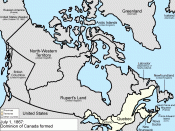Anticipation and Prevention In the past, emphasis was often on reactive responses to issues and problems. There has been increasing dissatisfaction with such an approach, and there are growing expectations that planners and managers should pay more attention to anticipation and prevention. This course of action, along with the acceptance that nothing is ever for certain, has led to endorsement of the precautionary principle, which states that when there are "threats of irreversible damage, lack of full scientific certainty shall not be used as a reason for postponing cost-effective measures to prevent environmental degradation"�. (Rio Declaration Principle 15 from Earth Summit, 1992.) A long-standing and common practice in water quality setting standard for the protection of human health has been to employ a safety factor as a way of affording extra protection against any kind of harmful agent. The development and enforcement of provincial water quality standards is a central management strategy, which is identified by several of Canada's provinces.
Some are working to develop what are called "Codes of Practice"� for managing hazardous wastes. Inventories of potential sources of pollution, such as abandoned petroleum, can enhance the ability to anticipate and resolve problems before they turn into serious health concerns.
First Nations A particular example of new partnerships that are being created to plan ahead is the evolving relationships between the federal and provincial governments with the First Nations. For example, in its discussion paper, British Columbia (1993, 6) identifies one of several areas requiring new laws and policies to the need to recognize, accommodate, and protect the interests of the water used by the First Nations. In Ontario, the Provincial Government is dealing with the First Nations on matters related to aboriginal and treaty rights and jurisdiction over natural resources on a "government-to-government basis"�. (A Statement of...


